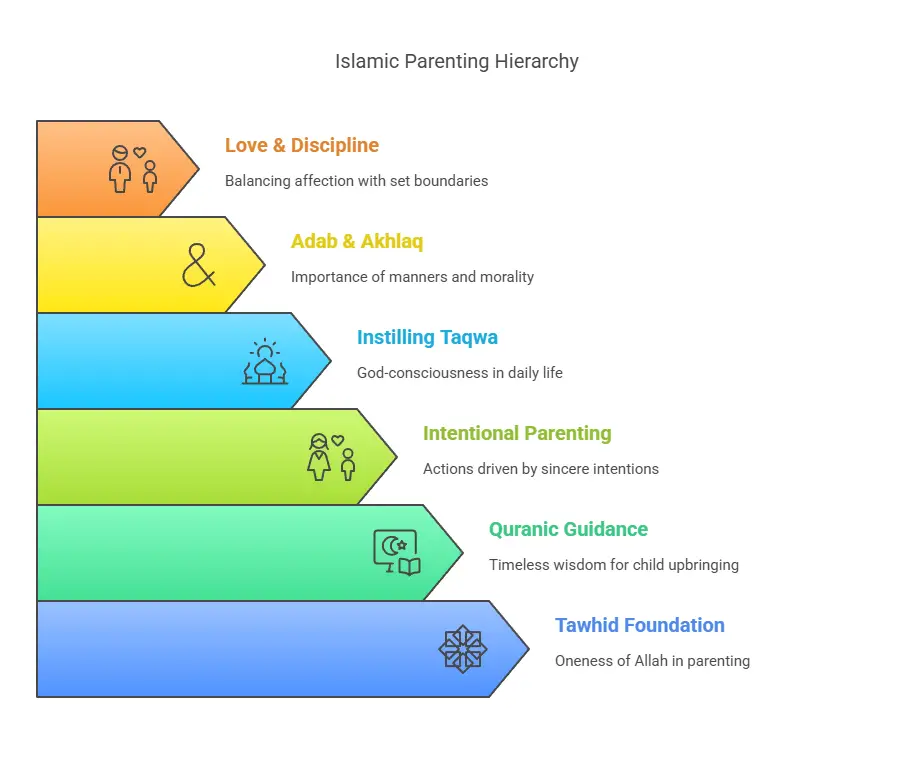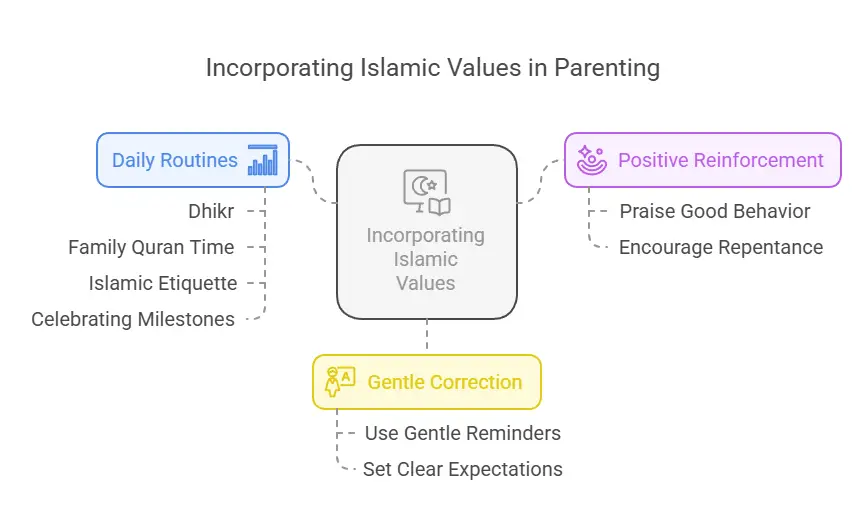
One of the most important tasks that were given to us by Allah (SWT) is parenting.
In Islam, the purpose of raising children is not only to feed them, but also to help them find their spiritual, emotional and moral balance in life.
Islamic parenting is based on the Quran and the Sunnah, which offer timeless rules to the parents for them to be able to raise children who are aware of Allah, loving, and also to have the capability of bringing in positivity to society.
The Foundations of Islamic Parenting
Parenting imbued with Islam is a faith-based mode of parenting that is Arabic-Islamic in its nature and which informs parents about nurturing the mental, physical as well as emotional development of children.
hese bases are actually drawn from the Quran, the Sunnah of the Prophet Muhammad (PBUH), and the concept of Tawhid which is the only monism of Allah.
Being in harmony with the tenets of the Islamic faith, mothers can provide their children with a complementary environment of spirituality and rights-based upbringing, which will help to instill in them positive virtues such as compassion and reverence to Allah.
Understanding Tawhid: The Core of Islamic Parenting
Islam is the belief in the oneness of Allah, which is the solid center of Islamic parenting. In the verse, “There is no deity but Him” (3:2), the on the Al-Wahid is the unique part, while the Resurrection is the common part of the sentence.
The Prophet stated that man – the son of Adam – sometimes makes wrong choices, so in this dialogue marital issues are discussed.
What is more, there is a power of forgiveness to be found in this issue of the Father.
Without thinking deeply about this verse, the statement of parenting is changed entirely.
This is how Tawhid becomes a parenting principle that affects the parents in their perspective on child-related duties.
However, it is Tawhid that parents are not seen as the ultimate authorities with their children, for it emphasizes that Allah, as the only Creator and Supporter of everything, is the real God and all people are just taking care of His creation.
If we add the element of full recognition of the divine purpose of each parent’s existence, we can say that regularly growing in self-awareness is definitely a useful prerequisite for happy and harmonious parent-child relationships.
Remember how you, as a child, used to feel when no one attended your activities? Rearing children on one principle is the right thing to do as it is the main force they remember and consider when in need of His help and caring.
These are short moments of giving gratitude to Him through your heart’s wideness and the total awareness of God’s empowerment.
To the best of their ability, Tawhid should be the focal point to which children will find grounding in their parents, so that solid spiritual development of their character may be set up along this course.
The Role of the Quran and Sunnah in Parenting
Islamic parenting’s ultimate guides are the Quran and Sunnah.
The Quran in turn offers timeless wisdom and principles, whereas the Sunnah offers practical examples from the life of the Prophet Muhammad (PBUH).
aken together, they represent a complete framework for the proper upbringing of our children in the right way.
For example, Surah Luqman (Chapter 31) is a straightforward parenting guide that reinforces the importance of thankfulness, good manners, and the need to avoid arrogance.
By the same token, the Prophet Muhammad (PBUH) showed himself to be a model of kindness and discipline to reverent youngsters when he played with his grandchildren and carried them on his shoulders during prayers.
Parents can do this by sharing stories with their children from the Quran and helping them understand the moral of the story as well as by setting a good example for their children for one of the ways in which the Prophet lived.
That is to say, the practice of storytelling is essential to ensuring that, as children, they develop a strong link with Islamic ideas.
The Importance of Intentions (Niyyah) in Raising Children
The whole code of Islam can be condensed to those two statements: actions are determined by the intentions.
very man shall get what he intended. (Sahih Bukhari). This principle concerns children too.
Parents have to redo their intentions each time they interact with their children, with the purpose of bringing up their offspring in the name of Allah.
These behaviors change the way parents view the mundane things like feeding, teaching, and disciplining.
For instance, a parent who teaches their kid to pray slowly will not only be performing their parental duty but will also think they are doing so to gain Allah’s pleasure.
Parents, who respect their intentions, will succeed in preserving their motivation and feeling like what they do makes sense even in the most difficult times.
This spiritual perspective also serves the purpose of teaching the little ones that their activities need to be undertaken with a view to the pleasure of Allah.
Instilling Taqwa (God-Consciousness) in Children
Taqwa, or God-consciousness, is the cornerstone of Islamic parenting. It involves teaching children to be mindful of Allah in all aspects of their lives, from their thoughts and actions to their interactions with others.
Parents can instill taqwa by:
- Encouraging children to remember Allah throughout the day, such as by saying “Bismillah” before eating or “Alhamdulillah” after completing a task.
- Teaching them to fear Allah’s displeasure and seek His pleasure in their actions.
- Using real-life examples to explain how taqwa guides decision-making, such as choosing honesty over lying.
By nurturing taqwa, parents help children develop a strong moral compass and a deep sense of accountability to Allah.
Teaching Adab (Good Manners) and Akhlaq (Morality)
Adab (good manners) and akhlaq (morality) are essential components of Islamic parenting. The Prophet Muhammad (PBUH) said, “The best among you are those who have the best manners and character” (Sahih Bukhari).
Parents can teach adab and akhlaq by:
- Modeling good behavior, such as speaking kindly, showing respect, and being patient.
- Encouraging children to practice Islamic etiquette, such as saying “Assalamu Alaikum” (peace be upon you) and “JazakAllahu Khairan” (may Allah reward you with good).
- Using stories from the Quran and Sunnah to illustrate the importance of good character, such as the patience of Prophet Ayyub (AS) or the honesty of Prophet Yusuf (AS).
By emphasizing adab and akhlaq, parents help children develop a strong Islamic identity and positive relationships with others.
Balancing Love and Discipline
Islamic parenting emphasizes the importance of balancing love and discipline. The Prophet Muhammad (PBUH) was known for his kindness and compassion towards children, yet he also emphasized the importance of setting boundaries.
Parents can achieve this balance by:
- Showing affection and expressing love regularly, such as through hugs, kind words, and spending quality time together.
- Setting clear expectations and consequences for behavior, while ensuring that discipline is fair and consistent.
- Using gentle correction and positive reinforcement to guide children, rather than harsh punishment.
For example, if a child makes a mistake, parents can explain why the behavior is wrong and encourage them to seek forgiveness from Allah. This approach helps children learn from their mistakes without feeling discouraged.
By balancing love and discipline, parents create a nurturing environment that fosters both emotional security and moral growth.
Practical Strategies for Islamic Parenting
Islamic parenting is not just about theoretical principles; it requires practical, actionable strategies that can be seamlessly integrated into daily life.
These strategies help parents create an environment where Islamic values are lived and experienced, rather than just taught.
By focusing on role modeling, daily routines, and positive reinforcement, parents can effectively nurture their children’s spiritual, emotional, and moral development.
Leading by Example: The Power of Role Modeling
Children are highly observant and often imitate the behavior of their parents. This makes role modeling one of the most powerful tools in Islamic parenting. The Prophet Muhammad (PBUH) said, “Every one of you is a shepherd and is responsible for his flock” (Sahih Bukhari). As shepherds, parents must lead by example, demonstrating the values and behaviors they wish to instill in their children.
Practical Tips for Role Modeling:
- Practice What You Preach: If you want your children to pray on time, ensure they see you doing the same. Let them observe your commitment to Salah, Quran recitation, and other acts of worship.
- Display Good Character: Show kindness, patience, and honesty in your interactions with others. For instance, if you make a mistake, admit it and apologize, teaching children the importance of accountability.
- Handle Challenges with Faith: When faced with difficulties, turn to Allah and demonstrate trust in His plan. This teaches children to rely on Allah during tough times.
By embodying Islamic values, parents create a living example for their children to follow, making these values more relatable and attainable.
Incorporating Islamic Values into Daily Routines
Islamic parenting is most effective when Islamic values are woven into the fabric of daily life. This approach ensures that children grow up seeing Islam as a way of life, rather than a set of isolated rituals.
Practical Ways to Incorporate Islamic Values:
- Start and End the Day with Dhikr: Encourage children to say “Bismillah” before starting any activity and “Alhamdulillah” upon completion. Begin the day with morning adhkar (supplications) and end it with evening adhkar.
- Family Quran Time: Dedicate a specific time each day for family Quran recitation or reflection. Even 10-15 minutes can make a significant impact.
- Islamic Etiquette in Daily Interactions: Teach children to greet others with “Assalamu Alaikum,” say “JazakAllahu Khairan” to express gratitude, and use polite language in conversations.
- Celebrate Islamic Milestones: Mark occasions like Eid, Ramadan, and the Hijri New Year with family activities that reinforce Islamic teachings.
For example, during Ramadan, involve children in preparing iftar, reading Quran together, and participating in charitable activities. These routines help children associate positive emotions with Islamic practices, making them more likely to embrace them willingly.
Using Positive Reinforcement and Gentle Correction
Islamic parenting emphasizes kindness and compassion, even when correcting mistakes. The Prophet Muhammad (PBUH) was known for his gentle approach to teaching and guiding others. Positive reinforcement and gentle correction are effective strategies for encouraging good behavior while maintaining a child’s self-esteem.
Practical Tips for Positive Reinforcement and Gentle Correction:
- Praise Good Behavior: When children exhibit positive behavior, such as sharing or helping others, acknowledge and praise them. For example, say, “MashaAllah, I’m so proud of you for helping your sibling. This is what Allah loves.”
- Use Gentle Reminders: Instead of harsh scolding, gently remind children of Islamic teachings. For instance, if a child forgets to pray, say, “Remember, Salah is a gift from Allah. Let’s not miss it.”
- Encourage Repentance: Teach children that making mistakes is part of being human, but seeking forgiveness from Allah is essential. Encourage them to say “Astaghfirullah” and make sincere tawbah (repentance).
- Set Clear Expectations: Explain the reasons behind rules and expectations. For example, if you ask them to lower their gaze, explain how it protects their heart and pleases Allah.
Example Scenario:
If a child lies, instead of punishing them harshly, sit down with them and explain the importance of honesty in Islam. Share the story of Prophet Muhammad (PBUH), who was known as “Al-Sadiq” (the Truthful) even before prophethood. Then, encourage them to apologize and make a commitment to be truthful in the future.
By using positive reinforcement and gentle correction, parents create a supportive environment where children feel motivated to improve and grow.
Conclusion
Islamic parenting is a sacred journey that requires patience, dedication, and a deep understanding of Islamic principles. By focusing on both the spiritual and emotional needs of children, parents can raise individuals who are not only successful in this world but also mindful of their responsibilities to Allah (SWT).
As you implement these strategies, remember that every child is unique, and parenting is a continuous learning process. Seek guidance from Allah, and don’t hesitate to connect with other Muslim parents for support. Together, we can nurture a generation that upholds the values of Islam and contributes positively to the world.
FAQs
- What is the best age to start teaching children about Islam?
- Start as early as possible, using age-appropriate methods like storytelling and simple duas.
- How can I teach my child to pray (Salah)?
- Begin by explaining the importance of Salah and gradually introduce the steps, making it a fun and engaging activity.
- How do I handle tantrums in an Islamic way?
- Stay calm, use gentle correction, and teach children to express their emotions in a healthy manner.
- What are some Islamic parenting books you recommend?
- “Parenting in the West: An Islamic Perspective” by Dr. Muhammad Abdul Bari and “Raising Children in Islam” by Dr. Ekram and Mohamed Rida Beshir.
- How can I protect my child from negative cultural influences?
- Build a strong Islamic identity, maintain open communication, and provide a supportive environment.





